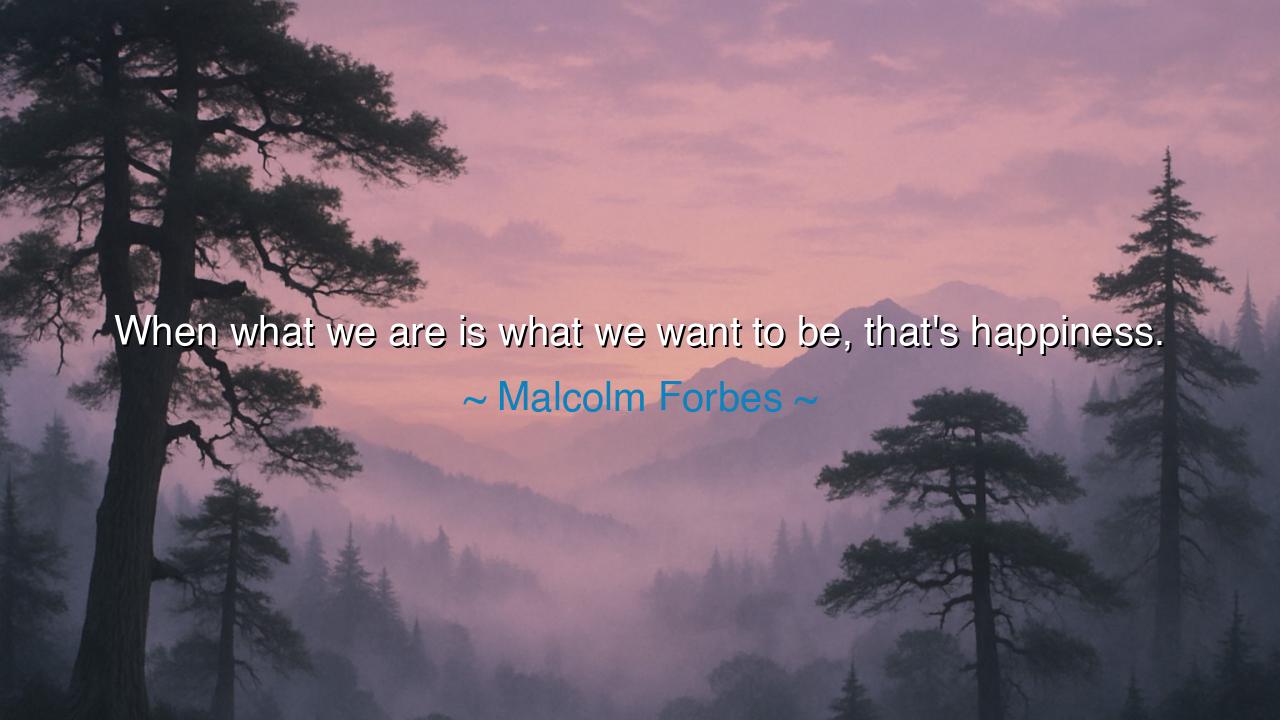
When what we are is what we want to be, that's happiness.






The words of Malcolm Forbes — “When what we are is what we want to be, that’s happiness.” — carry the serene wisdom of one who has seen both triumph and illusion. They remind us that true happiness is not a prize bestowed by fortune, nor a treasure buried in distant lands, but the quiet harmony between the self that is and the self that longs to be. It is the rare and radiant moment when our inner truth aligns with our outer life — when we cease to chase approval, to wear masks, or to fight against our own nature. In that unity of being, joy arises effortlessly, as the morning sun rises without struggle.
Forbes, a man who knew the heights of worldly success, spoke these words not as a philosopher in solitude but as a witness to the restlessness of ambition. Surrounded by wealth, fame, and the trappings of power, he saw that even those who possess everything may remain hollow if they live divided — one self for the world, another for the soul. Through experience, he discovered a truth as old as time: contentment is not found in achievement but in authenticity. When the heart’s desires and the life we live move in the same rhythm, then and only then do we taste peace.
To be what we want to be, however, is no easy task. It requires the courage to know ourselves — to look deeply beyond the noise of expectation, beyond the standards set by society, and to listen to the still, small voice within. Many spend their days striving to become what others praise, mistaking admiration for fulfillment. They climb mountains not because their spirit longs for the summit, but because they fear being unseen. Yet even when they reach the peak, their souls remain weary. But the one who walks the path of his own choosing, guided by conscience and truth, walks already in the kingdom of happiness, no matter how far from glory he may appear.
This wisdom is echoed in the story of Vincent van Gogh, the painter who lived in poverty and torment yet created beauty that outlived centuries. The world called him a failure, but his art was the pure expression of his soul — a conversation between his heart and the divine. Though misunderstood in his time, he lived and died true to his inner calling. He did not paint for applause or wealth; he painted because his spirit demanded it. In this, he embodied Forbes’s teaching: his being and his desire were one. And though the world denied him comfort, he achieved a deeper form of happiness — the peace of living authentically.
The ancients, too, understood this alignment of self as the essence of joy. Aristotle spoke of eudaimonia — the flourishing of one’s true nature through virtue and purpose. To live well, he said, is to act in harmony with one’s essence. The Stoics, too, taught that happiness is the agreement of the soul with its own nature. And the wise of the East — from the Buddha to Lao Tzu — spoke of the same truth in different tongues: that suffering arises from separation, and peace from unity. Thus, Forbes’s modern words are but the latest echo of humanity’s oldest lesson: that the secret to happiness is not to become someone else, but to come home to oneself.
Yet this unity must be forged through honesty. To become what we want to be, we must first ask — what is it that we truly want? This question demands stillness and sincerity. For many, the heart’s true desires lie buried beneath fear, habit, or imitation. To uncover them is to rediscover the sacred spark that was present even in childhood — the joy of doing something for its own sake, the instinct to create, to love, to grow. Once we remember this, we can shape our lives not as slaves to expectation, but as artists shaping our own truth. And when our days reflect that truth, happiness follows naturally, like fragrance from a blooming flower.
So, my friend, let this teaching dwell deeply in your heart: “When what we are is what we want to be, that’s happiness.” Do not measure your joy by what you possess or how others see you, but by the peace you feel when you are alone with yourself. Seek to align your actions with your beliefs, your work with your passion, your words with your soul. This harmony cannot be bought, only cultivated through courage, patience, and honesty.
And remember — happiness is not found at the end of the journey, but in the wholeness of each step taken in truth. The man who acts with integrity, who lives according to the light within, has already attained it. Let your being and your becoming be one. Live as you are meant to live, love as you are meant to love, and you will find that happiness is not something to seek — it is something to remember.






AAdministratorAdministrator
Welcome, honored guests. Please leave a comment, we will respond soon